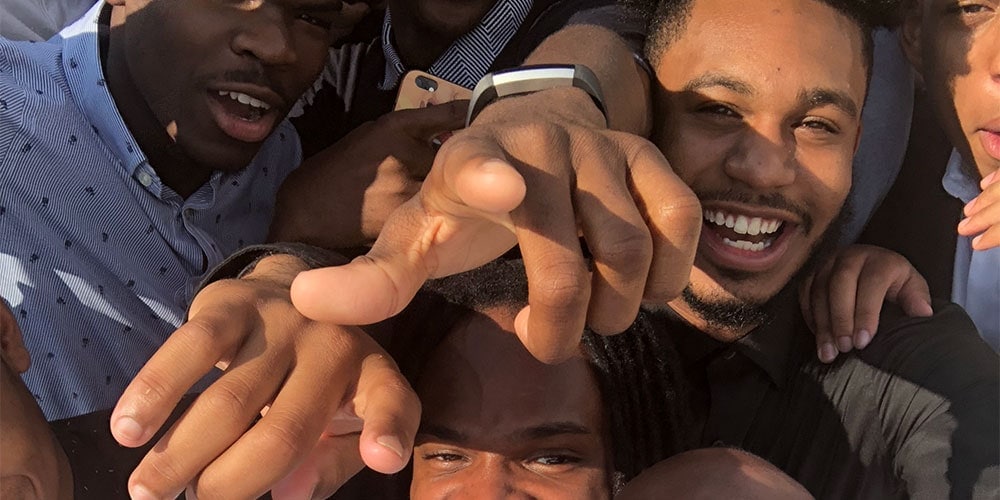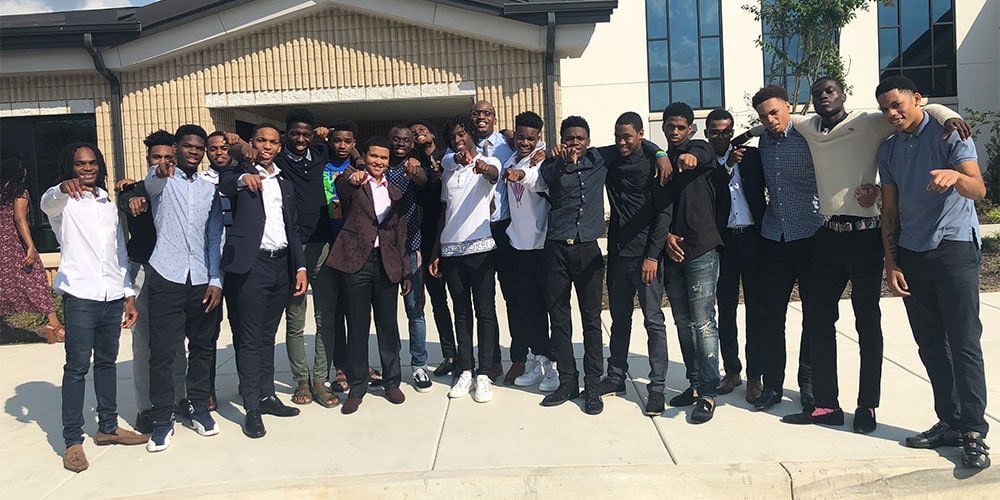
Toson Knight got off to a difficult life right from the very beginning. “I got kicked out of 13 different schools,” he says. “I got kicked out of preschool, and from that point it was like every year, every school.”
Knight, 32, grew up in the Highland Park area of Detroit, Michigan, “one of the worse areas you could grow up in the city,” he adds. His father wasn’t present in his life, and his relationship with his mother was complicated. The lack of home/life stability and the tough area he lived in didn’t do him any favors, but it’s surprising how the grace of God can work in a life like his, for better things were yet to come.
As Knight bounced from school to school, which involved a lot of time spent with his devout Adventist grandma, his future seemed uncertain. Finally a gentleman in the church offered to pay his way to attend Peterson-Warren Academy, the nearby Adventist school. But even that didn’t provide the greatest experience for him at first. “I hated it,” Knight remembers. “I thought they were playing favorites. I thought they really didn’t care, so I got into a lot of trouble there too. They almost kicked me out.”
Knight rode out his storms at Peterson-Warren and graduated—an achievement many of the young men in his community don’t realize for themselves. Despite his difficulties at school, the tide started to turn in Knight’s life. “Those were like the first people who actually showed me mercy,” he says. “When I say mercy, overall, it was like they still tried to work with me. Even though I was terrible. I was going against the grain. I was acting up. But I remember times they would call me and all of the teachers in and talk to me. I remember those times.”
Peterson-Warren Academy, like many Adventist academies around the nation, took its seniors on college days trips to explore possibilities for higher education. It was through one of those trips that Knight got to visit Oakwood University. But a tragic event was what solidified his deep desire to leave Detroit and study at Oakwood.
“I was down at Oakwood College days, and on my way back I got a call that one of my friends had been murdered,” Knight says. “The day I got back I went out to the scene, and saw his blood was still out there. I was crying, I remember that. For me it was final—I need to go to Oakwood. I need to go to Oakwood. I need to get away from this.”
Attending Oakwood University proved to be exactly the transformative experience Knight needed. “Going to Oakwood showed me good people. Good, strong, Christian people who pray with you and are about you and I never experienced that,” he remembers. “It just blew my mind the way they treated you down there—how they treated you like family and they didn’t even know you.”
Knight describes himself as an independent person, used to figuring things out on his own. So it was no surprise that navigating the often-frustrating paths to clearing finances on a private college campus became a challenge that he surmounted.
Despite his love for the campus and his studies—Knight majored in history and education—he decided to take a break after his first year and return to Detroit. Back home he didn’t fall back in with his old crowd, but began working in local politics for city council member Sheila Cockrel. He eventually made his way back to Oakwood, where he served as Student Association president for two terms. Graduation came, and Knight, ever the skilled networker, found himself with several job offers to consider. One of those was to be a lobbyist in Washington, D.C., which offered him the most financially lucrative path forward.
But Oakwood University had instilled something in him far beyond the pursuit of academic and professional success: a deep desire to give back. So Knight returned to Detroit with no career options on the immediate horizon. But again, through his stellar networking skills, he found himself seeking a job at one of the schools he’d been kicked out of years before, with an administrator who clearly remembered him.
“I was in sixth grade. I had pulled the fire alarm at this particular school, and she remembered,” says Knight. “When I called her, she said, ‘I remember you. You were the boy who pulled that fire alarm. I have just the job.’”
Knight became a behavioral interventionist, running the in-school suspension program. “I got to work with the bad kids. It was great. I loved it, and they were so surprised at how good I was at handling situations.” But Knight was far from settling into one role. While there, he also began working for Detroit mayor Michael Duggan’s campaign and worked with him for the next few years.
Knight’s passion for education and intervention for at-risk youth kept him in an academic trajectory career-wise. He is currently dean of students at Western High School, which he says is the most diverse high school in Detroit. Drawing from his own unique background, Knight isn’t fazed by much of his day-to-day duties that deal with students and behavioral infractions, working with teachers on improving classroom management skills, and setting the culture for the entire campus.

During Knight’s short break from Oakwood, he worked for one of Detroit’s juvenile detention centers. One of the obstacles he sought to tackle was the difficulty young people who have been in the system have in trying to stay on track once they are out. Now well connected as a result of his work for the mayor’s office, Knight decided to do something about it. “I wanted to be the guy that tries to help them transition back in to the community.” The program he started, Caught Up (which he’s run for about four years now), helps kids who have been incarcerated for any number of things—murder, robbery, sexual assault, drugs, guns, etc.—get their lives in order.
Caught Up has made progress in keeping young people out of prison on forward moving paths through its programs. According to Knight, the rate at which kids return to crime and eventual jailtime is about 50 percent. For those kids involved in Caught Up’s mentoring and lifestyle programs, it is 30 percent.
Caught Up takes a multifaceted approach through its programming. Saturday Night Live focuses on basketball, Bible study, and food, keeping young men off the streets on a Saturday evening and involved in activities that are good for their minds and bodies. Project Re-Entry, a program for incarcerated kids looking at a soon release, helps them to develop life skills such as resume building, financial literacy, college preparation, etc. Project Empower works with youth at local high schools exposing them to possibilities in higher education, job training, and life skill development, and helps them engage in their community in a positive way.
But for Knight, that’s not really enough. Getting a young man into college when he has little to no support or resources of his own has presented the organization with unique challenges. And while he is supportive of sending any of the program’s mentees to any college of their choosing, Oakwood University certainly holds a special place in his heart. So Knight will take a group of interested seniors to Oakwood’s preview program every fall. If a student decides on that campus, he will personally drive them to Alabama, help them get all their personal and dorm room supplies, and stay with them through their first Sabbath—supporting them through all the registration/financial clearance hurdles college freshmen frequently encounter. “I actually take a week off work and make sure I’m there with them until they are all clear, righ
t up until the day we go to church on Saturday,” Knight says. To date, Caught Up has 15 students enrolled at Oakwood University.
Carvell Goodlow, an Oakwood University student and mentee of the Caught Up program, was very close to Knight. He was tragically murdered in an off-campus incident in Huntsville in September 2018. Goodlow was a regular at Saturday Night Live, coming into the Adventist movement as a result. He was a special kid who had his share of ups and downs like many young people but is best remembered for his passion for Jesus and his way with words, which he used to uplift and encourage the entire Oakwood campus.
His loss has been very difficult for Knight. “It was the most painful, devastating thing that I’ve ever experienced, even after seeing a lot of my friends die. I never imagined that, because Carvell was actually closer to me than most,” Knight says. Goodlow even spent the summer living with Knight before returning to Oakwood for his sophomore year. “There was a group that had gotten really close to me and Carvell was part of that group.” The senseless loss of a young man with great potential, and a special “little brother” to Knight is something he will be working through for some time to come.
Knight’s experience with a grandma who instilled the importance of churchgoing and spiritual things (he attends Detroit Center church) has certainly had an effect on his own life turnaround. “I started getting involved in church, and that kind of changed me,” he remembers. “That was the beginning of my spiritual journey. Then in getting to Oakwood and being out there, it was easy for me to be part of church.”
Today Knight’s commitment to God and his love for young people who travel a similar path to his own, only serves to spur him to do more through his day job at Western High School and through Caught Up. For a young man coming from difficult beginnings, his life is a true example of what it means to pay blessings forward.
To learn more about Caught Up, or to help, visit www.caughtup.org
Wilona Karimabadi is an assistant editor of Adventist Review.